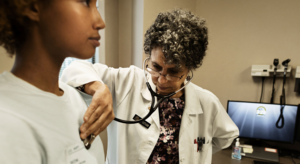
Today, I am excited to share with you an interview with one of my former clients who successfully transitioned into the field of Utilization Management. It just so happens that when I was preparing this blog, the company informed me that they are actively recruiting more physicians! So if you like what you hear from Dr. Susan Brister, you might be able to follow in her footsteps!
Susan Brister, MD, is a Board-Certified Internist who was working long hours seeing Medicare patients in the clinic setting when we met. She began a 6-month coaching program in March 2017 and landed her new job in Utilization Management right at the end of the 6 months.
Q: What made you decide to consider a non-clinical career?
Dr. Susan: Work had taken over my life. I realized I was not only neglecting myself but especially my aging parents. My father was ill and ended up dying before I transitioned. Any free time I had, I was traveling to be with him. There was no time for a healthy diet, rest, or exercise. Sometimes I was working up to 70 hours a week with all the charting.
Q: How did you decide what non-clinical career to transition into?
Dr. Susan: That was a very difficult decision. Being doctors, we want to know what we are getting into. The unknown is uncomfortable. It was unsettling to think about going into a new field and not knowing how much I would miss patients. At first, it was overwhelming. It helped me to read your blogs and see some of the options out there. Then when we did the coaching together, I gained more clarity on my preferences. Having the chance to speak with other clients of yours who had transitioned into different non-clinical areas was especially helpful.
Q: What kind of company are you working for?
Dr. Susan: The company is called an Independent Review Organization (IRO) and they do third-party reviews for health insurance plans. When claims are denied, they come to us for independent review. A lot of what we do is evaluate for medical necessity and whether or not the desired medication, treatment, or procedure meets appropriate criteria based on guidelines and current practices.
Q: Can you share some more specifics about your work?
Dr. Susan: Sure. I am on a team with a team lead and 3 other physicians. We get along very well and I like the camaraderie and support. My team lead is fabulous. When we start our day, we check our “queue” to pick up the most urgent cases. We also review the reviews from the external specialists, such as cardiologists and endocrinologists. These reviews can be quite complex. There is a good balance between cases that are very straight-forward and those that are complex. I am always learning about unusual diagnoses and new and novel treatments.
Q: What is your work schedule like?
Dr. Susan: I have the choice of either working five 8-hour days or four 10-hour days. I am doing a mix right now. Every month I cover a weekend shift and then have days off during the week.
Q: How is it working remotely?
Dr. Susan: The number one rule is to get up, exercise, take a shower and get dressed. No working in your pj’s! A lot of people warned me about that. It was really important for me to set up a home office. With all the time I spend on the computer, I wanted to have an ergonomic keyboard and chair. I actually use a kneeling chair. I have to be careful what I have in the fridge, as it is too easy to walk over and grab something.
Q: What else do you like about your job?
Dr. Susan: I like working for an IRO because there is no pressure to deny claims. We are not the insurer. I enjoy the variety of cases and using my clinical knowledge. I am always learning about unusual diagnoses and new and novel treatments. There is always some degree of challenge.
Q: How often do you do peer-to-peer calls?
Dr. Susan: I do anywhere from 1–8 peer-to-peer calls a day, with an average of 2 calls per day. 50-60% of the doctors I speak with are grateful. They are usually busy primary care physicians. They often don’t know how to get certain things approved and are grateful when I can help. Most of the others are at least polite. About 1% are irritated. I approach them by saying, “Here is the case. How can I help you?” I focus on the policies and specific criteria for approval. I can also ask my team lead for suggestions on a peer-to-peer call.
Q: Do you miss clinical practice? Can you imagine going back?
Dr. Susan: If I went back, it would be to do some occasional volunteer work. I am enjoying my life as it is.
Q: What kind of physician might enjoy this work?
Dr. Susan: Someone who is very detailed oriented and comfortable working on a computer. You must absolutely be self-motivated. Be ready to be a learner again. You also need to be transparent. If you stop to change the laundry for 10 minutes, you need to make up that time.
Q: Any tips for doctors considering this area of Utilization Management?
Dr. Susan: You can try some chart review as an independent contractor first to evaluate your interest level. Then find a company where the physicians are happy. See if the company is focusing on what the patient needs, versus what the insurer wants.
Q: Any last thoughts?
Dr. Susan: Last Christmas, after starting my new job, I was with my extended family at our vacation home and I noticed my brother was missing. Then I discovered he had disappeared to work on his computer. And it hit me; I don’t have to do that anymore!
If you are interested in being a Medical Director for this company like Dr. Susan, the basic requirements are:
Board Certification
Active State Licensure
5 years of clinical practice experience (residency counts)
Preferred specialties: Internal Medicine and subspecialties, Family Practice, Psychiatry, and Sleep Medicine.
Update as of 7/3/18 – The company is no longer taking applicants due to significant interest. When they are hiring again I will update the post.
My sincere thanks to Dr. Susan Brister for granting this interview!
Latest Posts
Find what you're looking for:
Popular Categories:
Career Change | Career Enhancement | Job Search | Personal Development
10 Comments
Leave a Comment























Great read, thank you!
I am a practicing doctor in Malaysia, with a diploma in Dermatology and some research experience. May I know if there are any opportunities for freelance medical writing at Doctor’s Crossing? Otherwise, I will be grateful to receive your suggestions.
Looking forward to hearing from you.
Regards,
Meena
Hello Meena, I am glad you enjoyed the blog. Thank you very much. Nice to know we had a reader in Malaysia. I appreciate your interest in doing freelance medical writing at The Doctor’s Crossing, however we don’t have any opportunities in this area. You might look into the American Medical Writer’s Association as a possible resource for freelance writers. https://www.amwa.org/ If you become a member you can create a profile for promoting yourself as a freelance writer. I am not sure whether or not you need to be in the US to do this, but I would check with the organization. Wishing you all the best.
Thank you for interesting interview. Do you come across positions for licensed clinical psychologists?
Best,
Heather Warchocki, Ph.D.
Hello Heather, thank you for reading! I do not personally come across jobs for clinical psychologists, but you might want to check out Dr. Todd Finnerty’s site. He is a clinical psychologist and he has a website focused on non-clinical review and IME work for psychologists and physicians.
http://www.toddfinnerty.com/
I hope this helps!
Hi Heather,
Thank you for another extremely informative post. I appreciate hearing about Dr. Brister’s personal experiences and can relate in many ways. I’m glad to hear things are working out for her!
All the best,
Adonis Saremi, MD
You are most welcome Adonis! Thank you for reading and commenting.
Good Day Heather !
Dr. Brister’s post was Quiet informative and detailed post. I couldn’t practice due to my personal reasons, I want to get considered for Insurance company jobs. I am a Medical doctor by profession.Can I be guided accordingly,
Thanks
Good day to you too Sameena! Thank you very much for reading the post with Dr. Brister’s interview. To work as a physicians for insurance company jobs, the basic requirements are an active unrestricted license in at least on state in the US and recent active practice. Most companies also require board certification as well as a minimum of 3 – 5 years clinical practice after residency. There a few companies that will hire without the board certification, and with less clinical practice, but they are the minority. Does this help answer your question?
I found your website after looking for a podcast done by my medical school buddy ( USC class of 1989 ) Dr David Oliveri.
I was wondering if you could do a podcast for physician approaching retirement who want to stay connected at some level.
I am in that category and have had a successful career first as a gastroenterologist in private practice and then as founder / medical director of a clinical research center specializing in early development trials.
I don’t need another job or more income but just wants to give back possibly using my medical experience.
Hello Peter – thank you so much for posting your comment and letting me know you’d like a podcast episode on ideas for what you can do as you approach retirement to give back and stay connected. I think this is a great suggestion and I will work on this idea. It may be a number of months before the episode airs, partly because we record in advance and also I’d like to do some reconnaissance on this topic. I imagine you may have already considered some options such as teaching, mentoring, consulting, volunteering in a nonprofit – either in the US or abroad, AI, writing, etc. to mention a few. There are many non profit organizations that can use the help of physicians who are interested in going oversees, but many in the US as well. There is a very early episode I did with orthopedic surgeon Dr. Sue Zimmermann about the different areas she considered and then started doing when she was nearing retirement. https://doctorscrossing.com/21/ Please let us know what you end up doing! I am sure whoever is the recipient of your talents and time will be very fortunate!